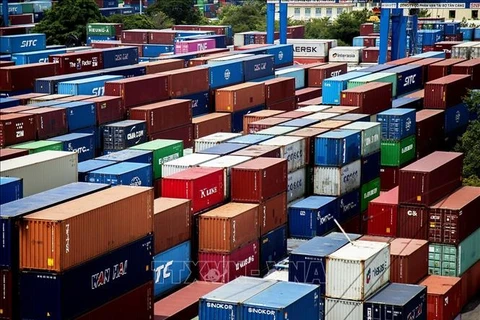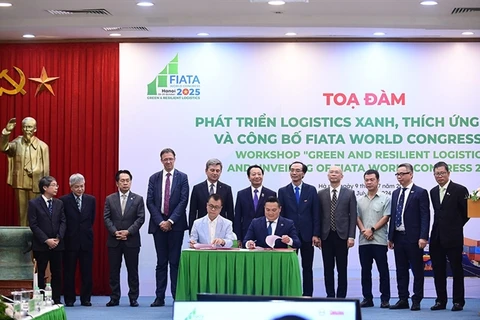
Hanoi (VNA) – The application of green logistics helps business brands better reach out to the world markets, while reducing costs and increasing competitiveness in the long term, experts have said.
Logistics has played a very important role in the development of the global economy in general as well as Vietnam in particular. However, logistics is also an industry with large emissions and high energy consumption.
According to a research by the Massachusetts Institute of Technology, transport activities alone contribute to 8% of the total CO2 emissions worldwide. If warehouses are added, this number can go up to 11%. For that reason, according to experts, logistics will also be one of the industries most strongly affected by the green transition trend.
Pressure for green transition
As consumers prefer environmentally friendly products and the transition to a greener economy is taking place globally, businesses are more interested in investing in green logistics, experts have said. Green logistics can help decrease transport costs and increase efficiency in the supply chain by optimising delivery routes and limiting the number of empty or half-loaded trucks on the road. Tran Thanh Hai, Deputy Director of the Agency of Foreign Trade under the Ministry of Industry and Trade (MoIT), said that the logistics industry has seen positive growth thanks to its position as a leading exporter of rice, coffee, textiles, footwear, phones, and components. This has led to increased demand for international distribution services. However, due to an imbalance of transport infrastructure when road transport predominates over air, rail, and water transport. Greenhouse gas emissions from road transport are 21.95 times higher than those of air transport, 19.94 times higher than maritime transport, and 245.49 times higher than rail transport. According to the World Bank, transport activities in Vietnam emit more than 50 million tonnes of CO2 each year, with road transport accounting for 85% of the total emissions. The figure is expected to increase by an average of 6-7% per year, hitting up to 90 million tonnes of CO2 per year by 2030.

At a seminar entitled "Green Logistics Adaptation - Solutions to Support Businesses," recently organised by the Industry and Trade Magazine, Dang Hong Nhung, a representative from the Agency of Foreign Trade, said the green transition trend will impact the logistics industry in two aspects. It will create pressure and also opportunity, as businesses have to comply, but will conserve waste and save energy.
Currently, the World Maritime Organization (IMO) is tightening regulations on marine fuels. These regulations will affect the entire world maritime industry, meaning Vietnam cannot avoid the regulations. In addition to the pressure to comply, pressure also comes from Vietnam's major importers such as the US, the EU and Japan. They all have very high requirements for green criteria.
“If in the past these criteria only applied to products, meaning the products must be green, now this criterion applies to the entire production process, so the production process of those products must be green,” Nhung said.
Recently, the EU issued the Carbon Border Adjustment Mechanism (CBAM), which will officially take effect from 2026. According to this mechanism, the EU will impose a carbon tax on Vietnam's imported products and this tax will depend on the amount of emissions from the production of that product.

The US is also expected to apply a carbon tax on imported goods in the near future. These regulations require the production processes of goods in exporting countries to be green.
Take advantage of opportunities to promote exports
In Vietnam, there are nearly 30 large logistics corporations of the world and more than 34,000 Vietnamese logistics enterprises. But the majority of Vietnamese logistics enterprises provide satellite logistics services, or in other words, they partially participate in the global logistics chain.
This will create pressure for Vietnamese businesses, when participating in the global logistics chain, as they must also meet the requirements to green distribution.
The Ministry of Industry and Trade has coordinated with associations such as the Vietnam Logistics Services Business Association and the Vietnam Logistics Human Resources Development Association to organise training classes and support for logistics service businesses.
Nhung advised enterprises that have business strategies on green logistics and are even implementing green logistics to regularly review to update new regulations as well as new preferential policies of the Government./.






















